Android之简单了解Bitmap显示图片及缓存图片
昨天我们学了如何连接网络,今天我们就学习一下如何从把网上图片显示到项目中
今天主要用到的是Bitmap 类
Bitmap是Android系统中的图像处理的最重要类之一。用它可以获取图像文件信息,进行图像剪切、旋转、缩放等操作,并可以指定格式保存图像文件
具体作用属性参考官方API: https://msdn.microsoft.com/zh-cn/library/system.drawing.bitmap(v=vs.110).aspx
不多说,看案例吧
做一个图片显示器:
activity_main.xml
1 <LinearLayout xmlns:android="http://schemas.android.com/apk/res/android" 2 xmlns:tools="http://schemas.android.com/tools" 3 android:layout_width="match_parent" 4 android:layout_height="match_parent" 5 android:orientation="vertical" 6 tools:context="com.example.imagelook.MainActivity" > 7 8 <EditText 9 android:id="@+id/et_path" 10 android:layout_width="match_parent" 11 android:layout_height="wrap_content" 12 android:hint="@string/editText" > 13 </EditText> 14 15 <Button 16 android:id="@+id/button1" 17 android:layout_width="wrap_content" 18 android:layout_height="wrap_content" 19 android:onClick="click" 20 android:text="@string/btn" /> 21 22 <ImageView 23 android:id="@+id/iv" 24 android:layout_width="wrap_content" 25 android:layout_height="wrap_content"/> 26 27 </LinearLayout>
mainAcitivity.java
package com.example.imagelook; import java.io.File; import java.io.FileOutputStream; import java.io.IOException; import java.io.InputStream; import java.net.HttpURLConnection; import java.net.URL; import android.app.Activity; import android.graphics.Bitmap; import android.graphics.BitmapFactory; import android.os.Bundle; import android.os.Handler; import android.os.Message; import android.util.Base64; import android.view.View; import android.widget.EditText; import android.widget.ImageView; public class MainActivity extends Activity { private EditText et_path; private ImageView iv; private Handler handler = new Handler(){ //处理消息 public void handleMessage(Message msg) { Bitmap bitmap = (Bitmap) msg.obj; iv.setImageBitmap(bitmap); }; }; @Override protected void onCreate(Bundle savedInstanceState) { super.onCreate(savedInstanceState); setContentView(R.layout.activity_main); //1、找控件 et_path = (EditText) findViewById(R.id.et_path); iv = (ImageView) findViewById(R.id.iv); } //2、点击按钮进行查看指定路径的源码 public void click(View v) throws IOException { new Thread(){ public void run(){ try { //2.1、获取访问图片的路径 String path = et_path.getText().toString().trim(); File file = new File(getCacheDir(),Base64.encodeToString(path.getBytes(), Base64.DEFAULT));//test.png if( file.exists() && file.length()>0 ) { //使用缓存的图片 System.out.println("使用缓存图片"); Bitmap cacheBitmap = BitmapFactory.decodeFile(file.getAbsolutePath()); //把cacheBitmap显示到iv上 Message msg = Message.obtain(); msg.obj = cacheBitmap ; handler.sendMessage(msg); }else{ //第一次访问 联网缓存图片 System.out.println("第一次访问连接网络"); //2.2 创建URL对象 URL url = new URL(path); //2.3 获取httpURLConnection HttpURLConnection conn = (HttpURLConnection) url.openConnection(); //2.4 设置请求方式 conn.setRequestMethod("GET"); //2.5设置超时时间 conn.setConnectTimeout(5000); //2.6获取服务器状态码 int code = conn.getResponseCode(); if (code == 200){ //2.7 获取图片数据 不管是什么数据(text 图片)都是以流行式返回 InputStream in = conn.getInputStream(); //2.7缓存图片 谷歌提供一个缓存目录 FileOutputStream fos = new FileOutputStream(file); int len = -1 ; byte[] buffer = new byte[1024];//1kb while((len = in.read(buffer)) != -1){ fos.write(buffer,0,len); } fos.close(); in.close(); //2.8 通过位图工厂获取bitmap //Bitmap bitmap = BitmapFactory.decodeStream(in); Bitmap bitmap = BitmapFactory.decodeFile(file.getAbsolutePath());//读取缓存 //2.9 把bitmap 显示到iv上 Message msg = Message.obtain();//消息池有消息池拿数据,没有new一个 msg.obj = bitmap ; handler.sendMessage(msg);//发消息 } } } catch (Exception e) { e.printStackTrace(); } }; }.start(); } }
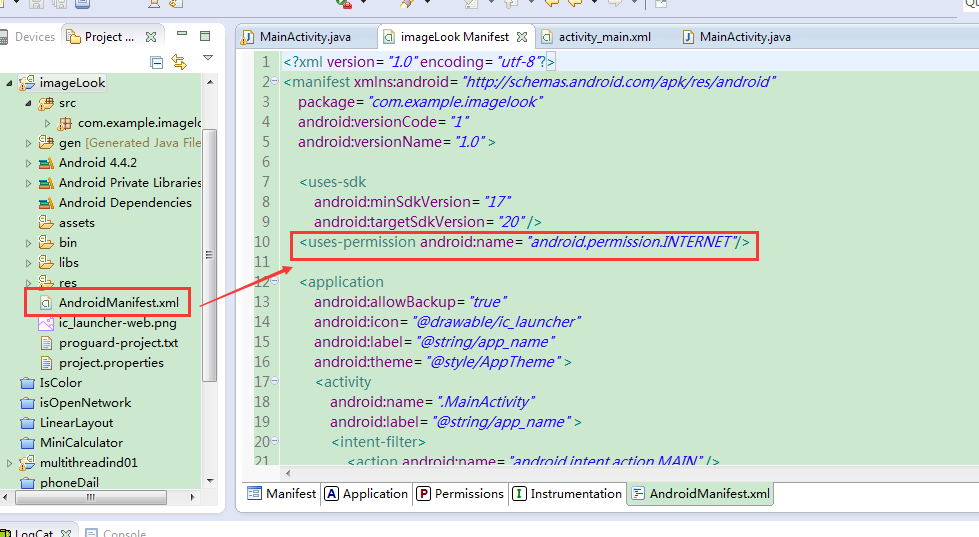
配置好就可以运行看下效果了
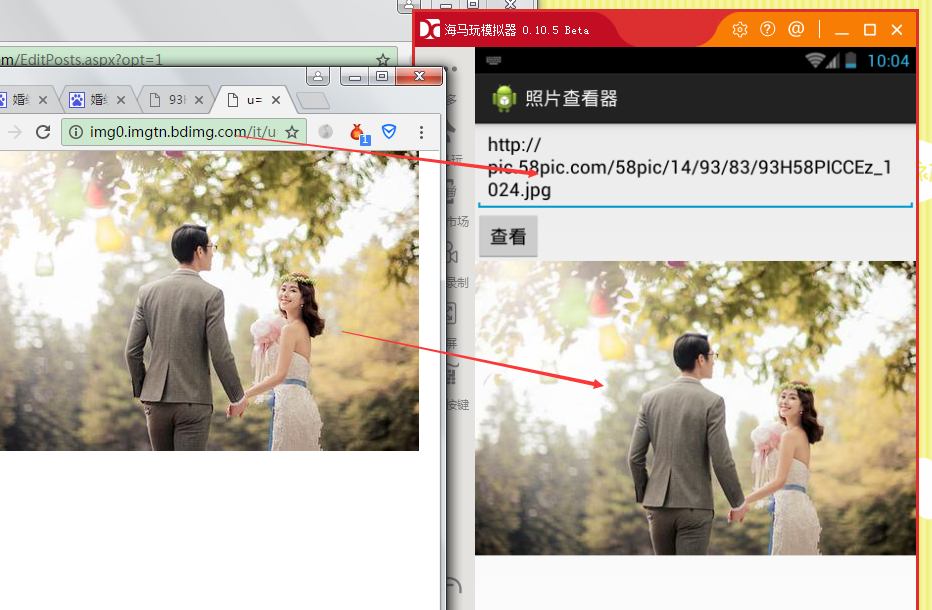
下面说一下,案例的小细节吧!
因为图片如果每次加载,每次都要从网上读取数据流,显示到手机上面,这样很容易浪费客户流量,所以第一访问时可以下载图片,以后访问直接访问内存里的就好了。
1、判断客户是否是第一次访问
2、多线程访问网络
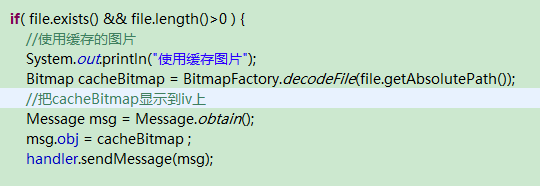
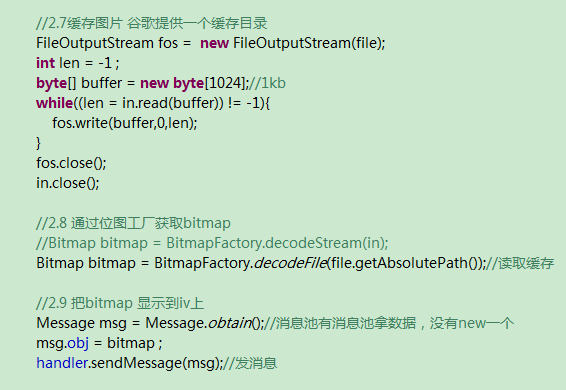
第一次访问,创建cache文件夹并保存文件
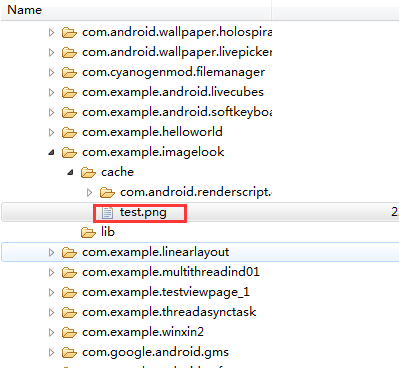
打印日志

再次访问,从文件中取出

我们可以在手机中清除缓存
例如海马玩模拟器:设置—>应用—>照片查看器—>清除缓存
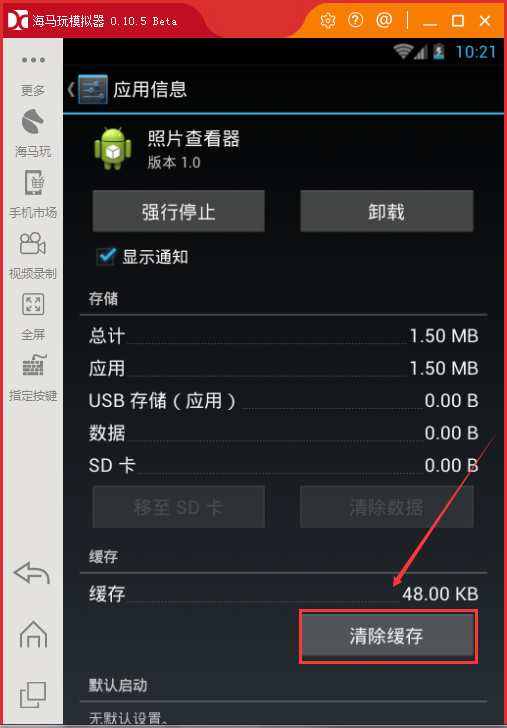
如果我们不给图片起名字,像这样

下面是生成的文件名

所以我们手机经常会莫名其妙的出现一些我们看不懂得文件,
其实只是做了这一个小小的动作,让用户不敢随便删除我们的文件



